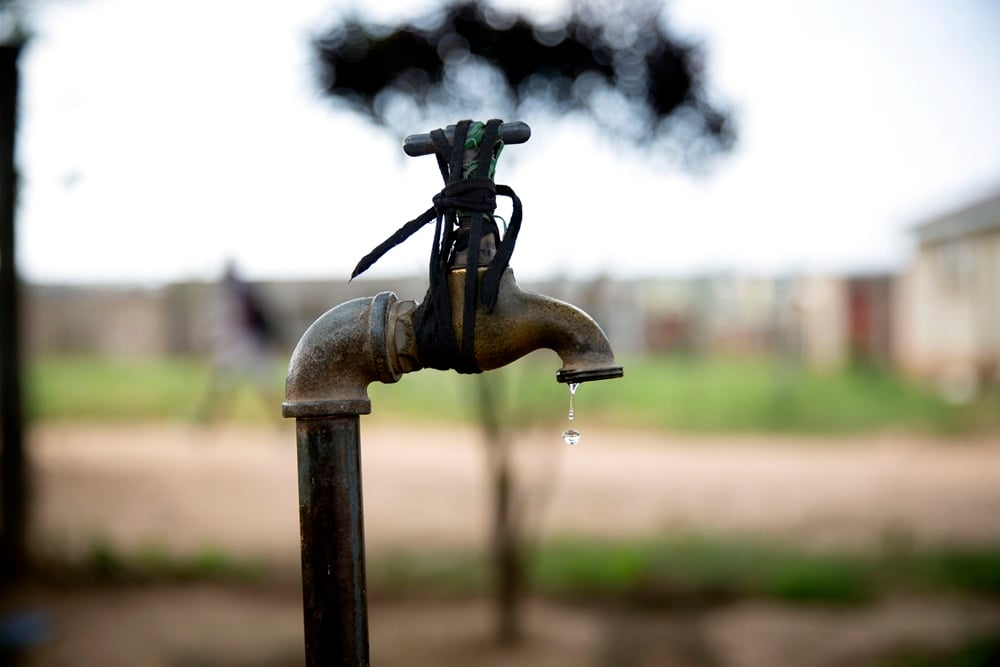
The Covid-19 pandemic laid bare unequal access to water in the country and showed there is still much more that needs to be done, writes Matikweni Khoza.
This year’s Human Rights Month commemoration coincided with the 25th anniversary of the adoption of the Constitution.
The Constitution, which is regarded as one of the world's most progressive, contains a Bill of Rights which forms part of the cornerstone of our democracy. It enshrines the rights of all people and affirms the democratic values of human dignity, equality, and freedom.
One of the rights recognised by the Constitution is for every citizen to have sufficient access to water.
The Constitution further places a legal obligation on government to ensure that this right becomes a reality for all people living in the country. Successive governments have, over the past 26 years, prioritised the provision of water especially to communities that were deliberately excluded by apartheid and the current administration continues to upgrade water infrastructure.
Unequal access to water
Despite the massive improvement, the arrival of Covid-19 has laid bare unequal access to water in the country and there is still much more that needs to be done to ensure access to clean water as a reality for all.
The pandemic has increased the demand for water since people are expected to regularly wash their hands to prevent the spread of the virus. We are, however, encouraged that during the pandemic we have been able to provide water tanks and pipes to increase access to water in high-density public areas, informal settlements, and rural areas.
We are also in the process of finalising the National Water and Sanitation Master Plan, to ensure water security in the country.
The plan outlines a number of urgent steps needed to address systematic and infrastructural challenges in order to secure continuous and uninterrupted water supply in the country. To accomplish this, government will also later this year table a Bill on the creation of a National Agency for Water Resources Infrastructure to oversee water supply across the country.
More importantly, government is giving renewed impetus to water losses estimated at R9 billion a year by training artisans. For instance, South Africa has partnered with Japan to train artisans through the multi-million rand Roodeplaat Training Centre to deal with water losses in communities. The centre was handed over by the Ambassador of Japan to South Africa, Maruyama Norio, and the event coincided with the commemoration of the World Water Day on 22 March.
Water awareness
The commemoration was used to highlight the importance of water and raise awareness about water scarcity in the world. It was also used to educate the public about their responsibility to protect and conserve water.
South Africa is a water scarce country and most of our water comes from rainfall, therefore, we are susceptible to sustained droughts or climate change. It is against this background that infrastructure is being improved to address the issue of water scarcity before 2025.
Using water wisely and sparingly is not the sole responsibility of government. It is important that communities and businesses play their part and take the necessary efforts to preserve it. As a country we need to inculcate the culture of water conservation to avoid running out of water and save it for future generations.
Communities must also protect water infrastructure and report those who damage infrastructure to the police so that we can root out criminal elements. Illegal water connections are against the law and those who are guilty of such an offence will face the full might of the law.
As Human Rights Month comes to a close, we should remember that we all have a role to play in conserving water and ensuring access to water becomes a reality for all. This is in line with the National Development Plan and Constitution which recognises all citizens’ right to clean water.
- Matikweni Khoza is an intern with GCIS.
*Want to respond to the columnist? Send your letter or article to opinions@news24.com with your name, profile picture, contact details and location. We encourage a diversity of voices and views in our readers' submissions and reserve the right not to publish any and all submissions received.
Disclaimer: News24 encourages freedom of speech and the expression of diverse views. The views of columnists published on News24 are therefore their own and do not necessarily represent the views of News24.
